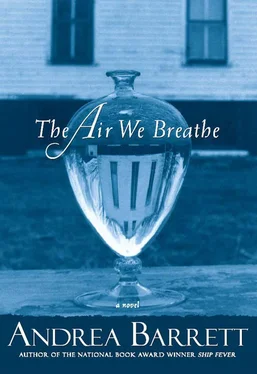Suddenly he was describing weekend trips to New Jersey or western Pennsylvania, longer trips to Kansas, winter nights spent sorting and cataloging his finds. Not just a hobby but his passion, his chief recreation, he said, and he was sure…
When he paused again, it wasn’t to ask if any of us had ever worked in a cement plant, as several had, nor to see what we, who’d had only Sundays off before arriving here, thought of having a “chief recreation,” but to ask if we knew what a fossil was. Most of us didn’t — a type of rock, some thought — but no one wanted to admit it. A few were curious what Miles would say if no one interrupted him. How long will a person keep talking about himself before noticing that no one is listening?
Quite a while, as it turns out. A truth some of us had already learned from each other. Once Miles said the word “paleontology,” he was over the falls, into the rapids, and out of sight, his concave chest lifting as he waved his arms while a clump of hair, gray and fine, bobbed over his forehead. Rock formations, strata, epochs, eras: “It doesn’t matter what you know or don’t about such things,” Miles said dismissively. “I’ll fill in the details later. My best trip was two years ago, when I spent the summer digging up dinosaur fossils buried in the western Canadian cliffs. So exhilarating!” he exclaimed, while we exchanged glances. “I brought a map of the strata to show you.”
Millions of years ago, Miles said, unfolding a small square covered with curving lines, giant creatures different from anything now living roamed the earth. In the oceans were ichthyosaurs and plesiosaurs; through the air flew pterosaurs; on land, dinosaurs crashed through tropical forests. Only their spoor, their tracks, and their bones remain now, turned to stone. In Alberta, in western Canada, the Red Deer River cuts through the prairie to form an enormous canyon, exposing these bones in the cliffs. The site has been widely explored since Tyrrell’s first excavations in the 1880s and…
See, we do remember. At the time, though, we stared blankly. Ornithomimus, bird mimic; Trachodon, which had webbed feet and a bill like a duck — what were we to think? On a steep cliff lay the Ankylosaurus, bearing a club on its tail. Miles explained that he, a friend from Doylestown, and that friend’s son (this would be our first hint of the Hazeliuses) had volunteered to act as assistants to a dinosaur-hunting expedition directed by a famous Canadian team.
Our flatboat, Miles was saying, floated between the cliffs. Day after day, a speck below the prairie, the mosquitoes attacking in such great swarms that we wore gloves all the time, along with nets that fit over our hats and tucked into our shirts. The boat could carry ten tons of bones, and we dug up nearly that many. Humerus as big as a person, femur the size of a tree (here Miles thumped his upper arm and his thigh); skull like a rowboat, claw like a foot. The endless labor he described — dig, chip, wrap, lug, pack, store, ship — we understood better, the work of moving tons of something from one place to another. We’d dug tunnels for subways, poured concrete for buildings, hauled bricks and grain or cut out shirt collars by the thousands, salted down millions of fish. What we couldn’t understand was what this person, speaking with so much enthusiasm and so little understanding, wanted with us.
UNTIL THE PREVIOUS WEEK, when he’d suddenly emerged as someone she could persuade, Naomi had thought of Miles mostly as a middle-aged man who received an inconvenient number of packages from bookshops far away, and whose linen required extra care. In the car she’d been surprised by his questions and his apparent interest in her; now she was further surprised by how much he knew and how passionately he spoke about his fossils. Old bones — who would care? Yet he seemed carried away by what he was trying to tell us. With her back to the window, facing us, she saw the same things he saw: our worn, mismatched outfits and slippers and our clumsy, nearly identical haircuts, shaped by the barber who visited monthly and cut us all at once. Our faces, which, betraying the countries where we’d started out, were unlike those she’d known before and, to her, looked dull.
One face, framed by a wheelchair, stood out from the others and caught her attention: Leo Marburg’s. His flossy dark hair, so similar in color and texture to her own; his narrow, unusually long and deep-set eyes, also like hers; his bony hands and his soft rounded nose. This was her first sight of him, but none of us noticed if she stared or blushed, looked away and then looked back, and she made almost no impression then on Leo. He was listening intently to Miles and, at the same time, looking around our main solarium, which he hadn’t seen before.
Two glittering rows of windows, front and back, kept perfectly clean and, except in the most bitter weather, always partway open. Six electric chandeliers, hanging from the ceiling; a piano, several round tables, plain wooden rockers and a great many lightweight bentwood chairs. The scrubbed-clean fireplace, never lit, and above it two of the framed instructional placards that dotted all our public rooms:
I.
Like the snakes in Ireland, there is no remedy for pulmonary tuberculosis in the sense of a specific medicine or form of treatment directly applied to the exciting cause — the tubercle bacillus. Innumerable supposed specifics have been proposed and tested, but all have been found wanting. The only treatment which has successfully stood the test of time and experience is the indirect one of developing and maintaining the resistance of the individual to the toxaemia of the infection. We name it the “hygienic-dietetic” or “open-air” treatment. In brief, it consists of (a) breathing pure out-door air night and day; (b) an abundance of nourishing food; (c) rest in the open air, all the time if the patient is febrile, and at least a portion of the time if afebrile; (d) proper disposal of the sputum to avoid reinfection; (e) combating all symptoms or conditions which interfere with the main treatment.
II.
The tubercle bacillus is an infinitesimally small, slender rod, in length from one-quarter to one-half the diameter of a red blood corpuscle. It is frequently more or less curved, and sometimes it has an irregular knobbed appearance. It may occur in chains or in small clumps. It is a long-lived tough parasite that may retain its vitality for several months but does not multiply outside the body, except when grown upon a favorable medium. It reaches the lungs in two principal ways: (1) directly through the respiratory passages, by inhalation, and (2) indirectly by way of the gastro-intestinal canal, by ingestion.
A, b, 1, 2, d. Naomi saw those placards too, before she turned toward the garden with its patio and central fountain. From May through September water pulsed up through pipes disguised as reeds and fell into a scallop-shaped bowl. Above the bowl rose a nearly life-size woman’s figure, carved from white marble. Her open arms and upturned palms pushed aside the folds of a cape to expose the enormous cross, which had two horizontal bars rather than one, incised on her gown from belt to collar. HYGEIA, read the plaque at her feet. FOUNTAIN OF HOPE. The fountain in her mother’s garden was smaller but also sported a carved inscription: Hope Springs Eternal . Pleasant phrase disguising what, in Naomi’s view, was her mother’s true self: a woman who used to have money and didn’t anymore; and was proud of succeeding despite that; and hated everyone because she’d had to. The girls she hired to work in the kitchen smirked at her behind her back.
Some of us were smirking at Miles: more talk, words like a river. We listened or dreamed or dozed, with no idea where the river might lead, thinking instead of a child’s face, a woman’s touch, a three-legged brown dog. Jaroslav, who had once worked as a cameraman at a movie studio, was imagining a sequence in which, against a black background, an eggshell lit from above and to the left, decorated with red geometric shapes and the thinnest gold lines — one of his mother’s treasured Easter eggs — would tumble delicately end over end. Albert was thinking about his father’s last letter and the passage he hadn’t been able to understand, not because his father’s hard pencil left such a light trace but because what he remembered of his father’s Norwegian vocabulary was fading, as had his knowledge of his mother’s Serbian. The rest of us were occupied similarly, which wasn’t unpleasant, exactly.
Читать дальше












